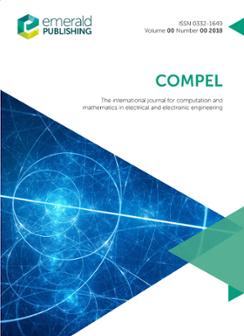COMPEL - The international journal for computation and mathematics in electrical and electronic engineering: Volume 20 Issue 4
Table of contents
Active compensation system of influence of non‐linear receivers on power network
Michal Gwóźdź, Ryszard Porada, Leszek FraockowiakPresents a system capable of achieving optimal compensation (in real time) by elimination of differential current and employing power electronic controlled current sources. The…
Simplified analysis of circuits containing ferromagnetic cores without air‐gaps
Z. Wlodarski, J. WlodarskaThe evaluation of currents in circuits with ferromagnetic cores leads to troublesome graphical or numerical procedures. These difficulties may be overcome by the introduction of a…
Implicit descriptions of piecewise‐linear configurations
J. CelBy a polyhedral or piecewise‐linear configuration in Rn we mean the finite union of finite intersections of open or closed halfspaces. It is proved that every such configuration…
Power losses in a steel sheet under deformed flux condition
Zbigniew Gmyrek, Grzegorz ZwolińskiThe commonly used power electronic systems in the drives of electrical machines as well as in the nonlinear receivers, being the transformer’s load, are the main origin of the…
On the computation of eigen modes for lossy microwave transmission lines including perfectly matched layer boundary conditions
Georg Hebermehl, Friedrich‐Karl Hübner, Rainer Schlundt, Thorsten Tischler, Horst Zscheile, Wolfgang HeinrichThe design of microwave circuits requires detailed knowledge on the electromagnetic properties of the transmission lines used. This can be obtained by applying Maxwell’s equations…
Discrete Huygens’ modelling simulation of scattered and guided waves at microwaves and optical frequencies
Yukio Kagawa, Takao Tsuchiya, Hirohisa Yamaguchi, Akihiro Fuke, Lingyun ChaiThe two‐dimensional discrete Huygens’ modelling or TLM simulation is presented for the TE electromagnetic field problems. The TLM element or node with variable traveling speed and…
Hysteresis loop modeling techniques and hysteresis loss estimation of soft magnetic materials
Jawad Faiz, M.B.B. SharifianThis paper presents various available and new techniques for prediction of the hysteresis loop, no‐load current curve and hysteresis losses. It is shown that linearization is a…
A phenomenological mathematical model of hysteresis
J. TakácsThis paper starts with the description of a purely mathematical model of the saturation curve and the hysteresis loop based on the fundamental similarities between the Langevin…
Park equations for distributed constants line
Sonia Leva, Adriano Paolo MorandoBy using the Park‐transformation the three‐phase TEM‐mode is analysed under the two different points of view: circuit and field. The first one leads, in terms of voltage and…
An asymptotic solution for the SHE equations describing the charge transport in semiconductors
Salvatore Fabio LiottaIn this paper an asymptotic solution of the spherical harmonics equations describing the charge transport in semiconductors is found. This solution is compared with a numerical…
Dual formulations for error estimation in non‐uniform transmission lines
Lorenza Corti, Massimiliano de Magistris, Antonio MaffucciA time domain discrete model for nonuniform transmission lines, based on a complementary formulation of the transmission line equations, is considered. By recasting the line…
Numerically efficient Green’s function for planar structures on multilayered dielectric in cylindrical enclosure
Olivera Pronić, Vera Marković, Bratislav MilovanovićA convenient form of spatial‐domain Green’s function for a point charge in multilayered dielectric medium enclosed by a conducting cylinder of circular cross‐section is presented…

ISSN:
0332-1649Online date, start – end:
1982Copyright Holder:
Emerald Publishing LimitedOpen Access:
hybridEditor:
- Prof Jan Sykulski